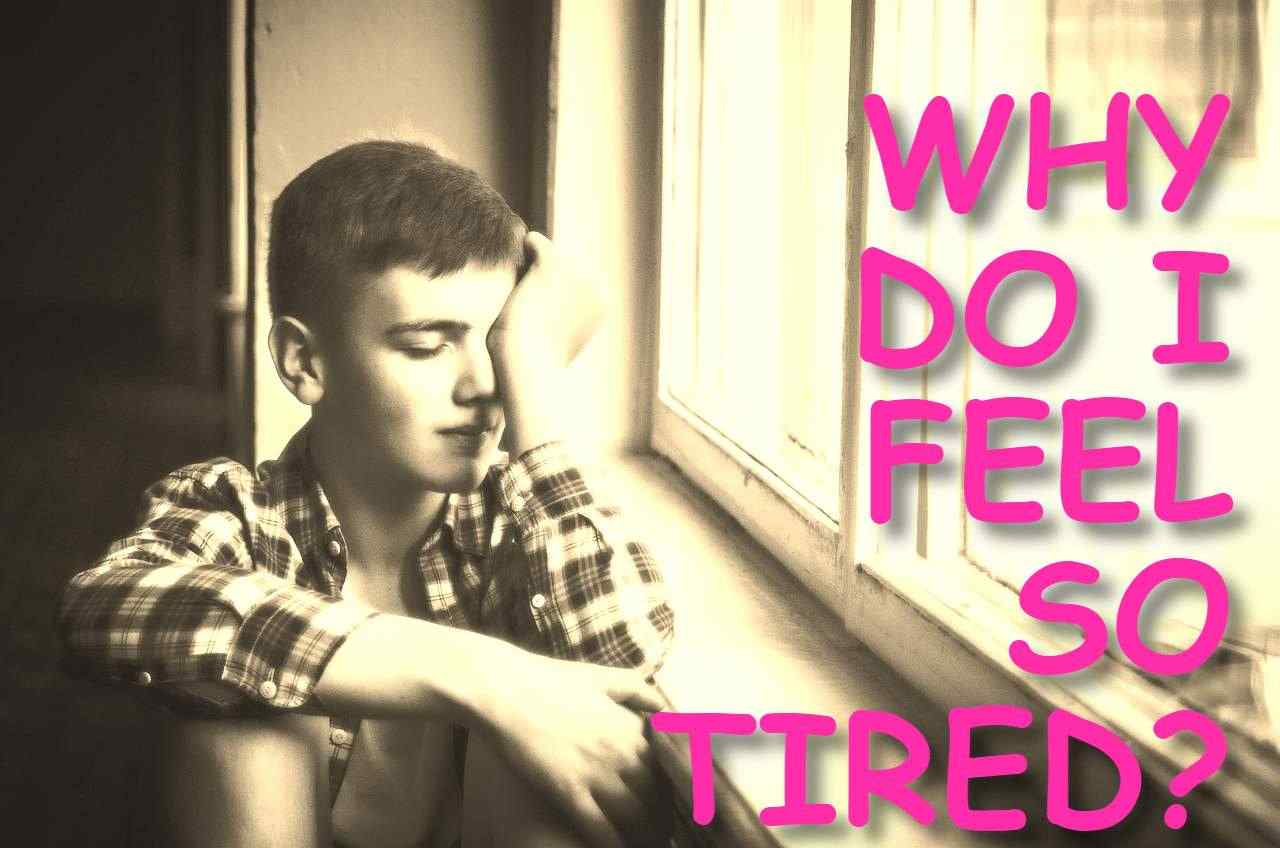Table of Contents
Do you often find yourself feeling tired all the time, lacking energy, and struggling to complete daily tasks? Feeling tired is a common experience, but when it persists, it can affect your productivity, relationships, and overall well-being. There are several reasons why you may be feeling tired, from underlying medical conditions to lifestyle habits. In this article, we examine 12 reasons for fatigue and low energy levels.
What is Fatigue and Tiredness?
Fatigue vs. Tiredness: What's the Difference?
Although often used interchangeably, there is a difference between fatigue and tiredness. Tiredness refers to the desire to sleep or rest, while fatigue refers to a more profound lack of energy and motivation, which may include physical or mental exhaustion, reduced performance, and difficulty concentrating. Fatigue can be acute or chronic and may be accompanied by other symptoms, such as shortness of breath, muscle weakness, and headaches.
When is Tiredness a Cause for Concern?
Feeling tired from time to time is a normal part of life, especially when you have a busy schedule or are going through a stressful time. However, if you constantly feel exhausted, even after getting enough sleep and rest, it may indicate an underlying medical condition or a lifestyle habit that requires attention. Persistent tiredness that affects your daily life could be a cause for concern and warrants a visit to your doctor.
How to Measure Your Energy Levels?
Measuring your energy levels can help you determine whether you are experiencing fatigue and how severe it is. One way to measure your energy levels is to rate your energy on a scale of 1 to 10, with 1 being extremely fatigued and 10 being fully energized. Another way is to use an activity tracker or mobile app that measures your steps, heart rate, and sleep patterns.
These tools can give you valuable insights into your energy levels and may help you identify patterns and triggers that affect your fatigue.
ome: Symptoms and Treatment
Chronic Fatigue Syndrome (CFS), also known as Myalgic Encephalomyelitis (ME), is a complex and debilitating condition that affects millions of people worldwide. CFS is characterized by profound fatigue that lasts for at least six months and is not relieved by rest. Other symptoms of CFS include muscle pain, joint pain, headaches, and difficulty concentrating. Currently, there is no cure for CFS, but treatment focuses on managing symptoms and improving quality of life.
Anemia: Causes, Symptoms, and Diagnosis
Anemia is a medical condition that occurs when your body does not have enough red blood cells to carry oxygen to your tissues and organs. Anemia can cause fatigue, weakness, dizziness, shortness of breath, and other symptoms. The most common cause of anemia is iron deficiency, which can be diagnosed with a blood test. Treatment for anemia depends on the underlying cause and may include iron supplements, vitamin B12 injections, or other medications.
Sleep Apnea: How it Affects Your Energy Levels?
Sleep Apnea is a sleep disorder that causes breathing to repeatedly stop and start during sleep, leading to disrupted sleep and reduced oxygen supply to the body. Sleep Apnea can cause fatigue, drowsiness, and difficulty concentrating during the day. It may also increase the risk of other health problems, such as high blood pressure, heart disease, and stroke. Treatment for Sleep Apnea usually involves CPAP (continuous positive airway pressure) therapy, which helps keep the airways open during sleep.

Lifestyle Factors that Contribute to Fatigue
How Much Caffeine is Too Much?
Caffeine is a stimulant that can boost energy levels and enhance mental alertness. However, too much caffeine can cause irritability, anxiety, and insomnia, leading to disrupted sleep and fatigue. The recommended daily limit of caffeine is 400mg, which is about 4 cups of coffee. If you feel tired the next day after consuming caffeine, consider reducing your intake or switching to decaf drinks.
Long COVID and Fatigue: What You Need to Know?
Long COVID is a term used to describe a range of symptoms that persist beyond the acute phase of COVID-19 infection. Fatigue is a common symptom of Long COVID, affecting up to 70% of patients. Long COVID may cause fatigue, weakness, brain fog, and other symptoms that can last for several weeks or months. If you have recovered from COVID-19 but still feel exhausted, it may be time to see your doctor for an evaluation.
Can Lack of Physical Activity Make You Feel Tired?
Regular exercise is essential for maintaining good physical and mental health. Lack of physical activity can cause fatigue, muscle weakness, and reduced stamina. Regular exercise can boost your energy levels, improve sleep quality, and reduce the risk of chronic conditions, such as type 2 diabetes and cardiovascular disease. Aim for at least 150 minutes of moderate-intensity exercise per week, such as brisk walking, cycling, or swimming.

Sleep and Fatigue: How are They Connected?
How Much Sleep Do You Really Need?
Sleep is essential for restoring and rejuvenating your body and mind. The National Sleep Foundation recommends that adults get 7-9 hours of sleep per night. However, individual sleep needs can vary based on age, lifestyle, and other factors. Some people may feel rested with less than 7 hours of sleep, while others may need more than 9 hours to feel refreshed. Keep a sleep diary to track your sleep patterns and adjust your habits as needed.
Good Sleep Habits for Managing Fatigue
Good sleep habits can help you fall asleep faster and stay asleep longer, leading to better quality sleep and reduced fatigue. Some tips for managing fatigue through good sleep habits include establishing a consistent sleep schedule, avoiding caffeine and alcohol before bedtime, creating a relaxing sleep environment, and limiting screen time before bed.
When to See a Doctor About Your Sleep Problems?
If you have trouble falling or staying asleep, experience abnormal sleep patterns, or feel excessively tired during the day, it may be time to see a doctor. Your doctor can perform a sleep study and recommend treatment options, such as lifestyle changes, medications, and therapies to help you manage your sleep problems.

Medical Tests for Fatigue and Low Energy
Blood Tests: What Can They Tell About Your Energy Levels?
Blood tests can provide valuable insights into your energy levels and help identify underlying medical conditions that may be causing fatigue. For example, a complete blood count (CBC) can detect anemia and other blood disorders, while glucose tolerance tests can check your blood sugar levels. Your doctor may also recommend thyroid hormone tests or other hormone tests to check your endocrine system.
Thyroid Hormone Tests: Could Your Thyroid Be the Culprit?
The thyroid gland produces hormones that regulate metabolism and energy levels. If your thyroid gland is not functioning properly, you may experience fatigue, weight gain, and other symptoms. Your doctor may order a thyroid hormone test to check your thyroid levels and determine if thyroid dysfunction is causing your fatigue.
Glucose Tolerance Test: Could Your Blood Sugar Be the Problem?
If you have type 2 diabetes or pre-diabetes, you may experience fatigue and reduced energy levels due to blood sugar fluctuations. A glucose tolerance test can measure your body's ability to use glucose and may help diagnose diabetes or other conditions that affect glucose metabolism.
In summary, feeling tired all the time can be caused by various factors, from medical conditions to lifestyle habits. To manage fatigue and low energy levels, aim for quality sleep, regular exercise, and a balanced diet. If your fatigue is persistent and affects your quality of life, see your doctor for a proper diagnosis and treatment. With the right treatment and lifestyle changes, you can feel less tired and more energized.

Frequently Asked Questions for “Why Do I Feel So Tired”
Q: What is one of the most common causes of fatigue?
A: Lack of sleep is one of the most common causes of fatigue. It is recommended that adults get at least 7-9 hours of sleep per night.
Q: What are some other causes of fatigue?
A: Other causes of fatigue include anemia, sleep apnea, chronic fatigue syndrome, type 2 diabetes, consuming too much caffeine, and not getting enough good sleep.
Q: Can long COVID cause fatigue?
A: Yes, it is common for people with long COVID to experience fatigue as a symptom.
Q: How does consuming too much caffeine affect fatigue?
A: Consuming too much caffeine can make you more tired and lead to fatigue.
Q: What is chronic fatigue syndrome?
A: Chronic fatigue syndrome is a medical condition characterized by extreme fatigue that lasts for at least six months and cannot be explained by an underlying medical condition.
Q: Should I see a doctor if I am always tired?
A: If you are always tired despite getting enough sleep and making lifestyle changes, it is recommended that you see a doctor to rule out any underlying medical conditions.
Q: How can I manage fatigue?
A: You can manage fatigue by getting enough sleep, exercising regularly, eating a healthy diet, reducing stress, and avoiding energy drinks and consuming too much caffeine.
Q: Can lack of quality sleep cause you to feel tired during the day?
A: Yes, lack of quality sleep can cause you to feel tired during the day and result in fatigue.
Q: What is obstructive sleep apnea?
A: Obstructive sleep apnea is a sleep disorder characterized by the repeated stoppage of breathing during sleep. It can cause symptoms of fatigue.
Q: Is fatigue a very common symptom?
A: Yes, fatigue is a very common symptom and can be caused by a variety of factors such as lack of sleep, stress, and medical conditions.
Q: Why am I always so tired?
A: There are many reasons why you may feel tired all the time. You may not be getting enough sleep, or the quality of your sleep may be poor. Additionally, medical conditions such as anemia, type 2 diabetes, or sleep disorders can also trigger fatigue.
Q: What can make you tired?
A: Factors such as lack of sleep, poor diet, excessive caffeine or alcohol consumption, stress, and physical inactivity can make you feel more tired.
Q: Do sleep medicines help with feeling tired all the time?
A: Sleep medicines may help you fall asleep, but they are not recommended as a long-term solution for fatigue. They can have unwanted side effects and may even lead to dependence on the medication.
Q: What are some symptoms like fatigue?
A: Symptoms such as decreased energy, feeling sluggish, and having difficulty concentrating can all be signs of fatigue.
Q: How can I improve the quality of my sleep?
A: You can improve the quality of your sleep by creating a comfortable sleep environment, establishing a consistent sleep schedule, limiting caffeine and alcohol consumption, and practicing relaxation techniques before bedtime.
Q: Can drinking too much alcohol affect my sleep and make me feel tired?
A: Yes, drinking too much alcohol can disrupt your sleep and make you feel less rested in the morning. While it can help you fall asleep more quickly, you may also sleep less deeply after drinking.
Q: Should I see a doctor if I'm always tired?
A: If you're always feeling tired despite getting enough sleep and making healthy lifestyle choices, you may want to speak with a healthcare provider. They may recommend tests to rule out underlying medical conditions that could be causing your fatigue.
Q: What are some common reasons you're feeling tired?
A: Some common reasons for feeling tired include lack of sleep, poor diet, stress, sedentary lifestyle, or underlying medical conditions.
Q: Can getting a good night's sleep help with fatigue?
A: Yes, getting enough sleep and improving the quality of your sleep can help you feel more energetic and less tired during the day.
Q: Why do I still feel tired after sleeping all night?
A: You may still feel tired after sleeping all night if the quality of your sleep is poor or if you have an underlying medical condition that affects your energy levels. It's important to speak with a healthcare provider if you continue to feel excessively tired despite making healthy lifestyle choices.
Related Articles
Web MD Why Do I Feel So Tired?
https://www.webmd.com/women/guide/why-so-tired-10-causes-fatigue
Bupa Why Do I Feel So Tired All The Time?
https://www.bupa.co.uk/newsroom/ourviews/tired-all-the-time
Very Well Mind Why Do I Feel So Tired?
https://www.verywellmind.com/why-am-i-always-tired-1067496
Womens Health Mag Why Do I Feel So Tired?
https://www.womenshealthmag.com/health/a34579232/why-am-i-always-tired/
Medical Express Why Do I Feel So Tired?
https://www.medicalexpressclinic.co.uk/blog/why-am-i-so-tired
The Guardian Why Do I Feel So Tired And When Is It Time To See A Doctor?
Oakland Middlewich NHS Why Do I Feel So Tired All The Time?
https://www.oaklandsmiddlewich.nhs.uk/test-2/why-do-i-feel-tired-all-the-time/
Good To Why Do I Feel So Tired?
https://www.goodto.com/wellbeing/why-am-i-so-tired-66857
Papoa Why Do I Feel So Tired?
Runners World Why Do I Feel So Tired?
https://www.runnersworld.com/health-injuries/a41561518/why-am-i-tired-all-the-time/
My Health Explained Why Do I Feel So Tired?
Health Share Why Do I Feel So Tired At Midday?
https://www.healthshare.com.au/questions/46823-why-do-l-feel-incredibly-tired-at-midday/
Nerd Momma Why Cant I Sleep?
https://nerdmomma.com/why-cant-i-sleep-insomnia-and-sleep-disorder/#more-2989
Nerd Momma Why Do I Sleep So Much?
https://nerdmomma.com/why-do-i-sleep-so-much-7-hypersomnia-nightmare-facts/#more-2578
Nerd Momma Why do we sleep?
https://nerdmomma.com/why-do-we-sleepwhat-8-hours-basic-sleep-does-for-you/#more-2066
Nerd Momma why am I so tired all the time?
https://nerdmomma.com/why-am-i-so-tired-all-the-time-12-causes-why-always-tired/#more-1599
